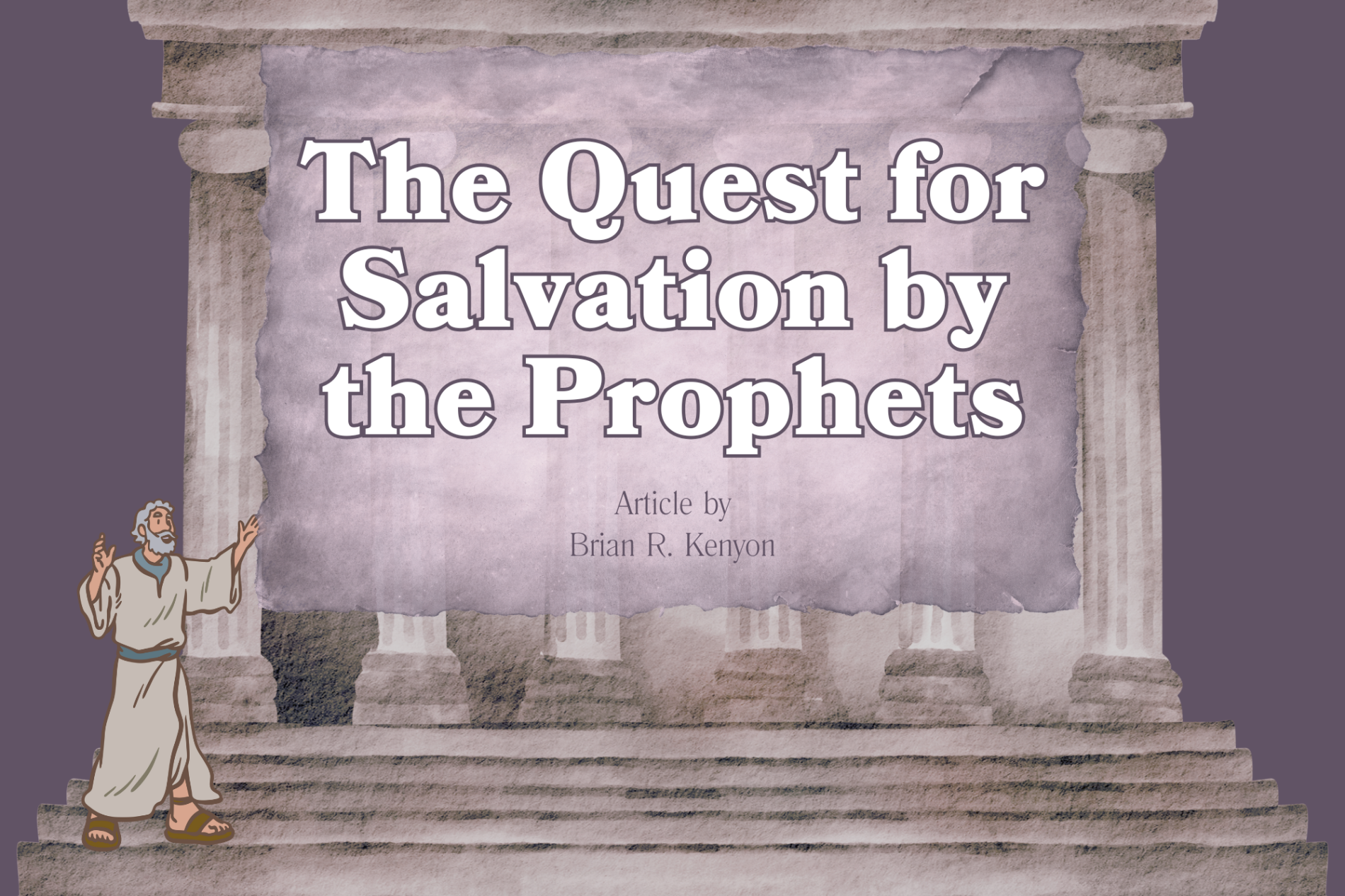By Brian R. Kenyon
Long before Peter proclaimed the first gospel sermon following the resurrection of Christ (Acts 2:22-39), the Old Testament prophets wrote about the coming Messianic kingdom (cf. Joel 2:28-32; Isa. 2:2-3; Dan. 2:44), which would eventually be fulfilled in the church of Christ (Mt. 16:18-19). As Peter wrote about “the salvation of your souls” that had sustained his first readers, who “have been grieved by various trials” (1 Pet. 1:6-9), he said:
Of this salvation the prophets have inquired and searched carefully, who prophesied of the grace that would come to you, 11searching what, or what manner of time, the Spirit of Christ who was in them was indicating when He testified beforehand the sufferings of Christ and the glories that would follow. 12To them it was revealed that, not to themselves, but to us they were ministering the things which now have been reported to you through those who have preached the gospel to you by the Holy Spirit sent from heaven—things which angels desire to look into. (1 Pet. 1:10-12)
Peter affirmed that the spiritual blessings available through Christ were far greater than the Old Testament prophets or even the angels could have envisioned throughout the time leading to the establishment of the church of Christ! Here are three vital roles the Old Testament prophets had and one they continue to have in “this salvation” made possible by “the precious blood of Christ” (1 Pet. 1:19).
The Prophets Searched
In First Peter 1:10-11, there are four terms that emphasizes the prophets’ words and desire to know how and in what circumstances their messages would be fulfilled. These terms are in different orders among the the translations. These are ordered as they appear in the New King James Version. First, the prophets “inquired [sought, ASV; made careful search, NAS; searched, ESV],” which comes from a word (ekzeteo, ἐκζητέω) that means to seek or search diligently; search intently. It is used in Acts 15:17, where Luke recorded James’ words about the future “tabernacle of David” being rebuilt, “So that the rest of mankind may seek the Lord, Even all the Gentiles who are called by My name” (cf. Amos 9:11-12). It is also used in Hebrews 11:6, “But without faith it is impossible to please Him, for he who comes to God must believe that He is, and that He is a rewarder of those who diligently seek Him.” This inquiry does not mean the prophets “merely pondered or wondered” out of curiosity, but that they actively looked to find something (Wayne Grudem, First Peter, Downers Grove, IL: InterVarsity, 1988, 73). This word is used in the Septuagint (LXX) to refer to searching Scripture (Ps. 119:22, 33, 45, 56, 94, 100, 145, 155).
Second, the prophets “searched carefully [searched diligently, ASV; careful … inquiries, NAS95; inquired carefully, ESV],” which is from a word (exeraunao, ἐξεραυνάω) that means to make a careful search; inquire carefully. The word only occurs here in the New Testament, but is found in the LXX. This word most often refers to searching through something like a house, a tent, a city, or even a country in order to find some person or thing. This word also is sometimes used in the LXX for searching through Scripture (Ps. 119:2, 34, 69, 115, 129). The inquiry and careful search in these first two verbs concerned the “salvation” the Old Testament prophets foretold.
Third, the prophets “prophesied,” which comes from a word (propheteuo, προφητεύω) that basically means a mouthpiece (adequately illustrated by Aaron’s being Moses’ prophet, Ex. 4:16; 7:1). In the case of the Old Testament prophets about whom Peter wrote, they were God’s mouthpiece, who proclaimed His message, preached, and predicted by the God-breathed inspiration of the Holy Spirit (2 Pet. 1:19-21). Peter did not indicate which prophets he had in mind; thus, the reference points back to all the prophets as a whole, from Moses to Malachi (cf. Lk. 24:26-27). The object of their prophesying was the “grace that would come to you,” which refers to the new covenant salvation blessings (cf. 1 Pet. 3:7; Acts 20:24; Rom. 5:1-2).
Fourth, the prophets were engaged in “searching [seeking to know, NAS95; inquiring, ESV],” which is from a word (eraunao, ἐραυνάω) that means to search, examine; inquire, try to find out (Jn. 7:52; Rom. 8:27; 1 Cor. 2:10; Rev. 2:23). It can also be used for searching Scripture, as Jesus challenged the stubborn Jews, “You search the Scriptures, for in them you think you have eternal life; and these are they which testify of Me” (Jn. 5:39). That for which they were searching was “what, or what manner of time [what person or time, ESV; τίνα ἢ ποîον καιρὸν]” this Messianic kingdom salvation would come. The source from which the prophets received their messages was the “Spirit of Christ” (cf. Rom. 8:9; Phil. 1:19), which is a reference to the Holy Spirit, the third member of the Godhead (cf. Mt. 3:16-17; 28:19; Jn. 14:26; 15:26). His designation as the “Spirit of Christ” also incidentally shows the pre-existence of Christ (cf. Jn. 1:1-3). The “Spirit of Christ” “testified beforehand [predicted, ESV]” (from promarturomai, προμαρτύρομαι) two truths: (1) the “sufferings of Christ,” which term is plural, perhaps to indicate the magnitude Christ’s sufferings (cf. Ps. 22:1, 7-8, 18; Isa. 52:13–53:12; Zec. 12:10); and (2) the “glories that would follow,” which refer not just to salvation but all blessings of Christ’s kingdom, ultimately including heaven (cf. 1 Pet. 4:13). The Old Testament prophets inquired, searched, and wanted to know what they were prophesying. We have more knowledge now, through the complete Bible (1 Cor. 13:8-13), than they ever did (2 Pet. 1:19-21).
The Prophets Served
The Old Testament prophets, as Peter taught, were not ministering to themselves but to his first readers, and by extension to us (cf. Rom. 15:4). The word “revealed” (from apokalupto, ἀποκαλύπτω) means to reveal, or disclose (1 Pet. 1:5; 5:1; Rom. 1:17-18; 8:18; 1 Cor. 2:10; Eph. 3:5). The word was used for only what God had revealed, whether through His mind (1 Cor. 2:10), His gospel (Rom. 1:17), His wrath (Rom. 1:18), His second coming (Rom. 8:18; 1 Pet. 1:5), or through the prophetic message (Eph. 3:5; 1 Pet. 1:12). Again, no prophets were specifically named but Peter referred to them generally.
Peter’s declaration, “to us they were ministering” (1 Pet. 1:12a), made clear that we are the beneficiaries of all those prophets’ messages. “Ministering [serving, ESV]” comes from a word (diakoneo, διακονέω) that means to serve, wait on; care for, see after, provide for. Peter used it later:
As each one has received a gift, minister it to one another, as good stewards of the manifold grace of God … If anyone ministers, let him do it as with the ability which God supplies, that in all things God may be glorified through Jesus Christ. (1 Pet. 4:10-11)
This is also the word used to describe Jesus, who “did not come to be served, but to serve, and to give His life a ransom for many” (Mt. 20:28).
“The things” the Old Testament prophets were ministering were revealed through the preaching of the gospel to Peter’s original readers. These “things” (auta, αὐτά, which is from autos, αὐτός) from this context were, first, “the sufferings of Christ and the glories that would follow” (1 Pet. 1:11), and second, the content of the gospel preached to them (1 Pet. 1:12). This content came through “the Holy Spirit” (cf. “the Spirit of Christ,” 1 Pet. 1:11). That is, the Holy Spirit revealed through the first century preachers the exact message of the prophets relevant to each first century occasion and its proper application (cf. Jn. 14:26; 15:26; 16:7-13), so that what was spoken and written was exactly as the all-knowing God intended (cf. Lk. 12:11-12; 2 Tim. 3:16-17). The details of this complete package of blessings was not known until revealed through the gospel. Not even angels, God’s heavenly servants (Heb. 1:14), knew, even though they desired to “look into” (from parakupto, παρακύπτω) those truths (1 Pet. 1:12b). Christians today are the blessed recipients of the Messianic blessings no one even comprehended until Acts 2 and after, not to mention experience (Eph. 1:3)!
The Prophets Support
The personal ministries of the prophets have been over for a long time. However, not only did they serve Christians today by the content and fulfilment of their words, but they will also continue to support the gospel for as long as God allows this world to stand (cf. Rom. 15:4). From an apologetic standpoint, their accurate prophecies and precise fulfilment stand forever as a testimony to the God-breathed inspiration of the Scriptures (Isa. 7:14 cf. Mt. 1:22-23). However, for an application to Peter’s instruction, note the following prophetic fulfilment of specific prophecies directly relating to “this salvation … the grace that would come to you … and the glories that would follow [the sufferings of Christ]” (1 Pet. 1:10-11).
First, in Acts 2, the first recorded gospel sermon this side of Christ’s resurrection, Peter quoted Psalm 16:8-11, making the application:
Men and brethren, let me speak freely to you of the patriarch David, that he is both dead and buried, and his tomb is with us to this day. 30Therefore, being a prophet, and knowing that God had sworn with an oath to him that of the fruit of his body, according to the flesh, He would raise up the Christ to sit on his throne, 31he, foreseeing this, spoke concerning the resurrection of the Christ, that His soul was not left in Hades, nor did His flesh see corruption. (Acts 2:29-31)
From this Peter went on to declare, “Therefore let all the house of Israel know assuredly that God has made this Jesus, whom you crucified, both Lord and Christ,” to which some hearers responded, “Men and brethren, what shall we do?” (Acts 2:36-37). The post-resurrection (Rom. 10:9-10) plan of salvation was then first publicly announced (Acts 2:38 cf. Mt. 28:18-20; Mk. 16:15-16).
Second, following the healing of the lame man recorded in Acts 3:1-11, Peter took the opportunity to preach about the Christ whom the Jews had crucified (Acts 3:12-26). Note in this sermon Peter’s use of a once future time now a reality (cf. “glories that would follow,” 1 Pet. 1:11) and his references to the Old Testament prophets, especially Moses and Deuteronomy 18:15-17:
Repent therefore and be converted, that your sins may be blotted out, so that times of refreshing may come from the presence of the Lord, 20and that He may send Jesus Christ, who was preached to you before, 21whom heaven must receive until the times of restoration of all things, which God has spoken by the mouth of all His holy prophets since the world began. 22For Moses truly said to the fathers, “The Lord your God will raise up for you a Prophet like me from your brethren. Him you shall hear in all things, whatever He says to you. 23And it shall be that every soul who will not hear that Prophet shall be utterly destroyed from among the people.” 24Yes, and all the prophets, from Samuel and those who follow, as many as have spoken, have also foretold these days. (Acts 3:22-24)
In explaining the “these days,” Peter revealed:
You are sons of the prophets, and of the covenant which God made with our fathers, saying to Abraham, “And in your seed all the families of the earth shall be blessed.” 26To you first, God, having raised up His Servant Jesus, sent Him to bless you, in turning away every one of you from your iniquities. (Acts 3:25-26)
Jesus, the prophet about whom the prophet Moses spoke, ushered in the Messianic kingdom. Those Jews to whom Peter spoke were among the “first” to receive these blessings, or to use Peter’s words, “the glories that would follow” (1 Pet. 1:11).
Third, as Philip encountered the eunuch, the Ethiopian was reading:
He was led as a sheep to the slaughter; And as a lamb before its shearer is silent, So He opened not His mouth. 33In His humiliation His justice was taken away, And who will declare His generation? For His life is taken from the earth. (Acts 8:32-33 cf. Isa. 53:7-8)
When he asked Philip, “of whom does the prophet say this, of himself or of some other man?” (Acts 8:34), “Philip opened his mouth, and beginning at this Scripture, preached Jesus to him” (Acts 8:35). We do not know exactly how Philip developed his message to the eunuch, but we do know that Philip’s preaching about Jesus included baptism, for the next verse declares, “Now as they went down the road, they came to some water. And the eunuch said, ‘See, here is water. What hinders me from being baptized?’” (Acts 8:36). The rest is history: he stopped the chariot, they both went down into the water, the eunuch was baptized, and he continued on the journey rejoicing (Acts 8:37-39). Indeed, the Old Testament prophets continue to support the gospel plan of salvation and other kingdom blessings through the fulfilment and application of their prophecies!
Conclusion
There was so much the angels did not see and the prophets did not know, even though they wrote concerning these blessings. Now, however, we know because it has been revealed to us, as Paul would write, “to the intent that now the manifold wisdom of God might be made known by the church to the principalities and powers in the heavenly places, according to the eternal purpose which He accomplished in Christ Jesus our Lord” (Eph. 3:10-11).

 Alumni
Alumni Lectureship Audio
Lectureship Audio Lectureship Video
Lectureship Video
